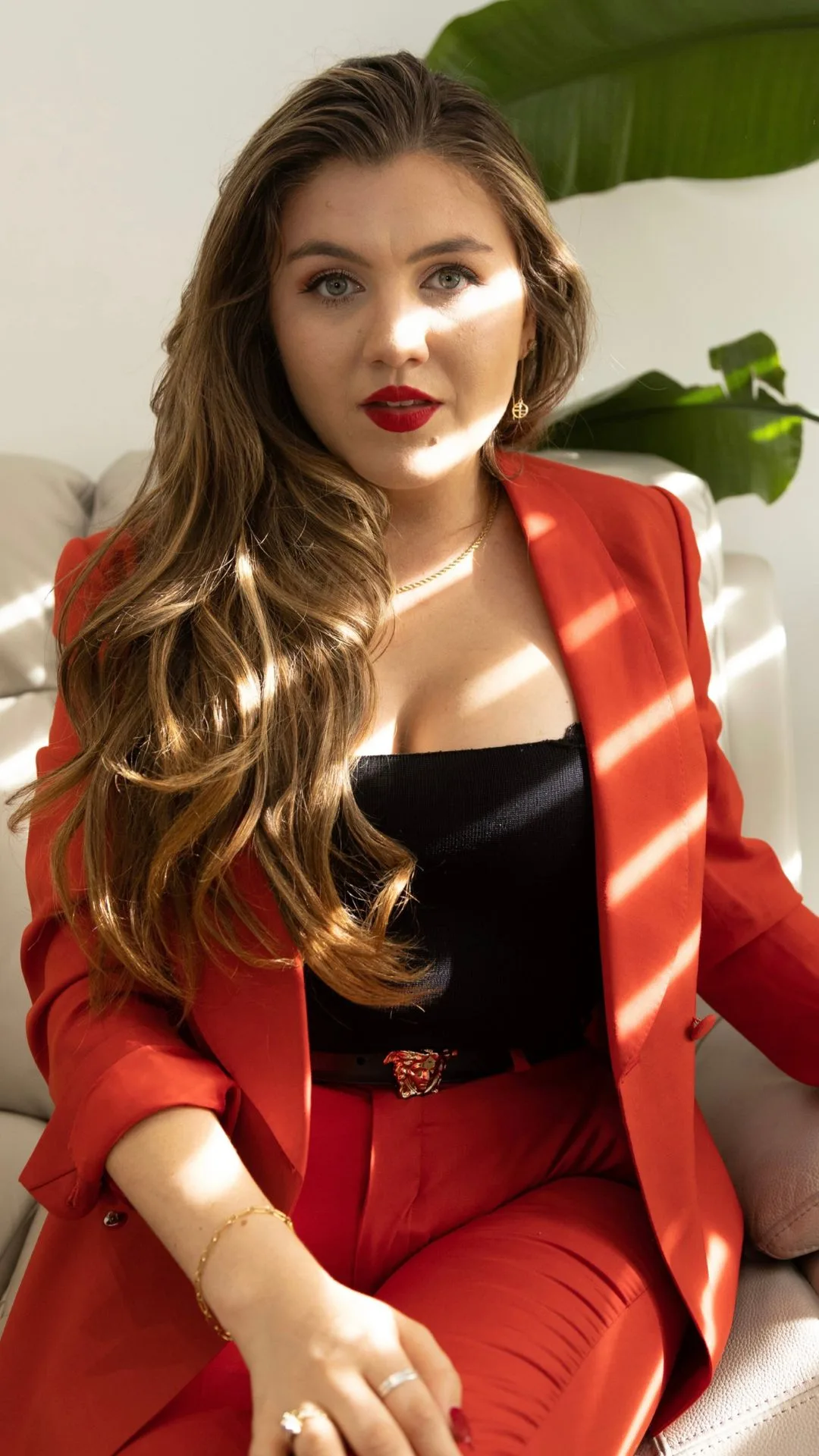Abbie Chatfield doesn’t just speak her mind – she builds entire cultural conversations around it. Since bursting onto screens as a contestant on The Bachelor, the 29-year-old has become one of Australia’s most outspoken and beloved broadcasters. Whether she’s unpacking pleasure politics on her hit podcast It’s A Lot, confronting misogyny on national radio, or launching sex toy collabs with cult-favourite brand Normal, Chatfield is unafraid to talk about the things that still make people blush.
On May 27, she’ll take that candour to the Museum of Desire – a new immersive exhibition in Melbourne that explores sexuality, technology and fantasy across time – for a one-night-only conversation with cultural historian and Kinky History creator Dr. Esmé Louise James. The evening promises provocative insights, historical hot takes, and one very mysterious “orgasmic laser harp.” But for Chatfield, the event is part of a larger mission, which is to normalise female pleasure and pull desire out from the shadows.

On Defining Desire And Living Without Shame
“Oh my God. That’s such a complex, high-level question,” Chatfield tells marie claire when asked to define desire. “I don’t think I’ve ever really had to reclaim desire in my personal life, because I haven’t experienced a lot of shame around it. It’s not that I grew up in a particularly sex-positive household, but I didn’t grow up with any patriarchy at home either – no dad or male figure I respected enough to instil that kind of shame about bodies or sex.”
To Chatfield, the way society treats desire is both absurd and revealing. “It’s kind of funny that desire has been stigmatised. Like, God forbid you enjoy something,” she laughs. “There’s this cultural narrative that if you’re enjoying life, you’re selfish or indulgent or just obsessed with yourself. But the reality is, especially since COVID, our lives have become more and more devoid of pleasure. So it’s important to actively figure out what brings you joy, not just what we’re told should bring us joy.”
On Helping Others Reclaim Pleasure
Through her public work, Chatfield often sees how deeply shame is embedded in conversations around sex and pleasure – especially for women. “For a lot of my audience, I think reclaiming desire is deeply tied to overcoming shame,” she explains. “When I did the collaboration with Normal, people messaged me saying they’d never tried vibrators or butt plugs before, and it literally changed their lives – some even said it saved their relationships.”
In heterosexual relationships, she notes, there’s still an imbalance in how desire is perceived. “Men wanting sex is normalised, but if a woman initiates or talks about it, it can be seen as threatening. Poor men, right? God forbid your girlfriend wants to orgasm too.”
That’s why, for Chatfield, being vocal is powerful. “If I can speak about this publicly – on TV or online – then maybe someone else feels safe enough to talk about it privately with their partner. That’s the goal.”
On The Museum Of Desire And King Edward’s ‘Fuck Chair’
Despite being a leading voice in sex-positive spaces, Chatfield admits the word ‘desire’ isn’t part of her everyday vocabulary. “You’re right – we don’t really use the word ‘desire’ that much. I don’t even use it that much myself. But it’s not a stagnant or singular thing.”
That’s part of why she’s so excited about the upcoming event at the Museum of Desire. “The Museum is all about exploration, and I think that’s what desire is too. I love Dr. Esmé – she’s incredible – and we’ll be having a conversation about the history of desire and the tools used throughout time.”
True to form, Chatfield has already gone down a few (very NSFW) rabbit holes. “I saw this TikTok going around about King Edward’s ‘fuck chair’ – have you seen that? So embarrassing that I have. But it’s fascinating! There are all these weird and wonderful historical sex toys. I want to understand how people – both elites and ‘normal’ people – expressed desire over time.”
There’s one installation she’s especially intrigued by. “They have something called the ‘orgasmic laser harp.’ I don’t even want to Google it – I want to go in blind and just experience it. The whole night is immersive. People can enjoy the museum, listen to the conversation, explore. It should be really fun.”
On Conservative Backlash And The Myth Of The Divine Feminine
But as conversations about pleasure become more public, Chatfield has noticed a disturbing trend, a conservative resurgence that threatens the progress made. “I think there’s a new wave of conservatism happening,” she says. “You’ve probably seen the PrettyLittleThing rebrand, or how House of CB is leaning into this cottagecore conservatism. It’s definitely a pushback.”
During COVID, sexual wellness flourished. “All people could really do was masturbate and reflect,” she jokes. “But now… there’s this far-right, anti-liberation movement trying to roll things back. And that includes sexual liberation.”
Even supposedly empowering trends, like “divine feminine” advice online, can be insidious. “Some of it seems harmless, but a lot of it is just the same old patriarchal values repackaged -telling women to be quiet, small, and to never express what they actually want, whether that’s in bed or in life.”
On AI Teaching Women How To Text Men
Chatfield is equally horrified by the rise of AI tools teaching women how to be more “dateable.” “My jaw is on the floor. That is horrifying,” she tells marie claire. “That’s feeding right into this patriarchal idea that we need to trick men into liking us.”
She’s blunt about the cost of that kind of compromise. “It’s very easy to find a partner if you’re willing to become someone completely different to please them. But what kind of relationship is that? It’s built on performance, not authenticity.”
And the statistics don’t lie. “Men benefit more from relationships than women do. Married men live longer; single men don’t. But for women, it’s the opposite. Single, child-free women live the longest. That tells you everything.”
On Women Using AI For Emotional Labour
While she hasn’t heard of friends relying on AI for relationship advice, Chatfield sees the risks. “If you’re typing, ‘Why did my boyfriend ignore me last night?’ into a chatbot instead of talking to him… maybe rethink the whole relationship.”
She recalls a chilling listener story from her podcast. “She found her boyfriend’s ChatGPT history. He’d written something like, ‘My girlfriend is perfect – she does my laundry, gives me money, cooks for me – but she’s a bit bigger than I’d ideally like, and I don’t know if I should be with her because I’m not coming hard enough.’ I’m not kidding.”
The woman dumped him, but the damage was done. “Can you imagine? Asking a robot if you should leave someone because they’re doing everything for you… except being your exact body type? It’s grim.”
The Power Of Being Loud – And Real
At the end of the day, Chatfield’s mission isn’t about shock – it’s about honesty. “These systems are deeply embedded,” she says. “But if talking about orgasms online helps one person feel less ashamed, I’ll keep going.”
With her appearance at the Museum of Desire, she’s inviting others to be curious, unfiltered, and unafraid. Because when it comes to reclaiming pleasure, there’s nothing shameful about wanting more.


